League of Olympic Swim Legends: Kieren Perkins Tops 1500 With Hackett & Salnikov
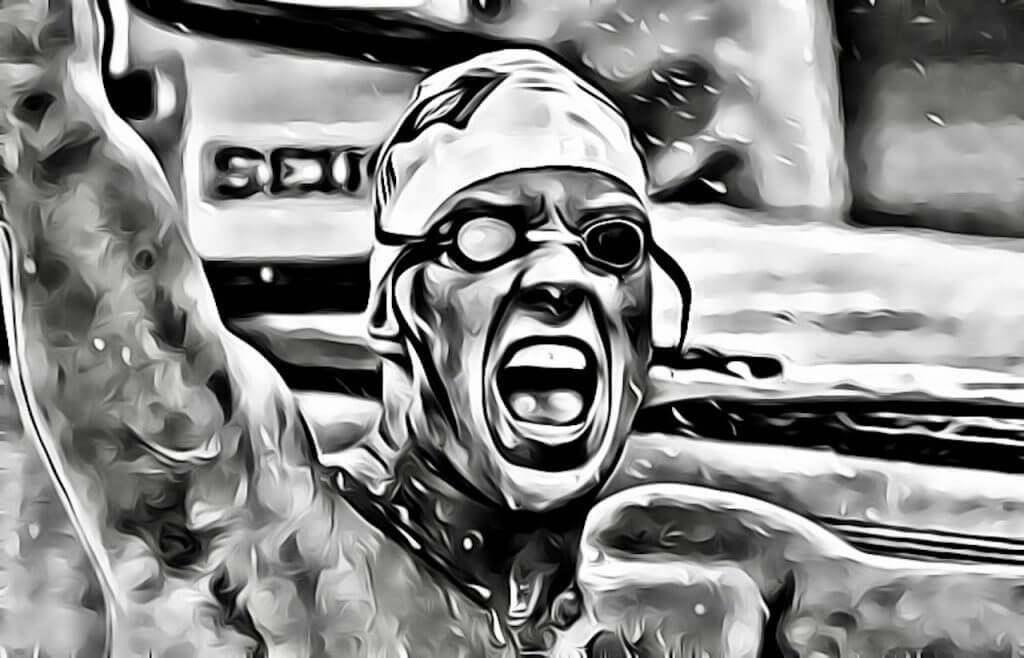
What would have unfolded had Tokyo 2020 gone ahead as planned this week – and where would it all have fit in the thread of Olympic swim legends and pioneers like Kieren Perkins, Grant Hackett and Vladimir Salnikov? To mark the eight days over which the Tokyo 2020 Olympic Games would have unfolded had the coronavirus pandemic not forced postponement, the team at Swimming World is filling the void with a Virtual Vision Form Guide and League of Olympic Swimming Legends.
Day 8, event 3 – Perkins leads a battle of four Aussies Vs the rest
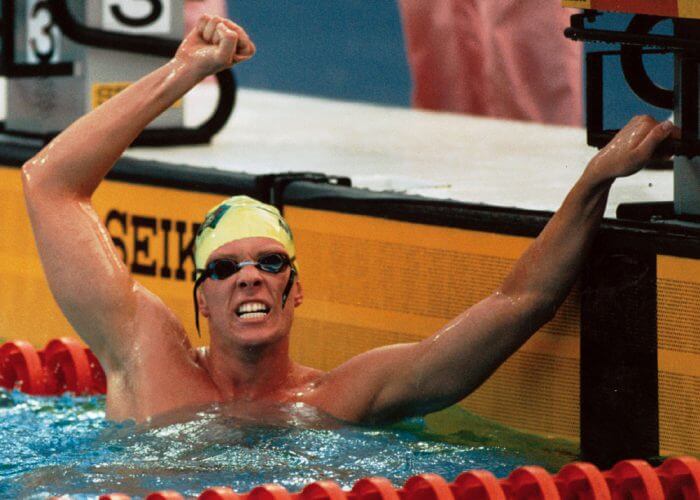
Photo Courtesy: by: Russell McPhedran
Men’s 1500m Freestyle
The Podium
- Kieren Perkins (AUS)
- Grant Hackett (AUS)
- Vladimir Salnikov (URS)
The Other Finalists (Listed Alphabetically):
- Arne Borg (SWE)
- Mike Burton (USA)
- Brian Goodell (USA)
- John Konrads (AUS)
- Murray Rose (AUS)
Our Lane 9* place goes to the only man not in the list above to have claimed gold in a World record, his 1924 victory testing 20mins and granting gold by about 35 seconds (2sec every 100m, that’s dominance!):
- Andrew ‘Boy’ Charlton (AUS)
* – in our series, we will use Lane 9 to add an athlete whose story reflects extraordinary situations of different kinds, including being deprived by those who fell foul of anti-doping rules or by political decisions or, indeed the Olympic program, as well as simple facts such as “he/she was the only other title winner who claimed gold in a WR but didn’t make out top 8 on points”
All-Time Battle Of Olympic Swim Legends Goes To Kieren Perkin
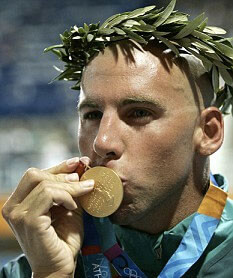
Grant Hackett – Photo Courtesy: Swimming Australia
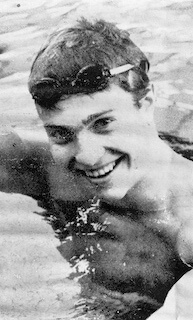
Vladimir Salnikov – Photo Courtesy: NT/CLArchive
Endurance is the name of the game in the 1500 freestyle, and apparently it doesn’t just apply to negotiating 30 laps. It also applies to career longevity. Historically, four men are two-time champions in the 1500 free, the United States’ Mike Burton, the Soviet Union’s Vladimir Salnikov and Australia’s Kieren Perkins and Grant Hackett.
The last event of our Legends series saw Perkins awarded with the gold medal. After leading Aussie gold-silver finishes in 1992 and 1996, Perkins added a silver medal in 2000, his countryman Hackett taking gold and the distance torch, which he then backed up with his own double with Athens 2004 victory before silver at Beijing 2008. Extraordinary podium runs over any event, outer-orbit when it comes to the 1500m.
Perkins set three world records (spanning nine years) during his career and was the first man to undercut the 14:50 barrier, those standards and the time they spent on the books granting him the edge over his tough opposition.
Claiming the silver medal Hackett in a fight for the wall with Salnikov, the Australian getting the touch on the strength of his three podiums and a World record. One World record – but it was a doozy. On the way to the 2001 world title, Hackett clocked 14:34.56 to shred the 1994 World record of Kieren Perkins by seven seconds. And but for a Chinese story stacked with anti-doping controversy, Hackett would lead the global pace on the clock yet, 19 years on.
Salnikov’s pair of Olympic gold medals arrived eight years apart. Racing at the 1980 Games in Moscow, Salnikov topped the field and became the first man to break 15 minutes. However, there was a missing element to the triumph, as the United States (including reigning champ Brian Goodell) and more than 60 other countries boycotted the Games. Salnikov didn’t get the chance to defend his gold in 1984, as the Soviet Union took part in a retaliatory boycott of the Los Angeles Games. Seemingly past his prime, Salnikov dug deep in 1988 and reclaimed his status as Olympic champ. He set three world records over nearly 11 years.
Bronze for Salnikov, then – but not by a comfortable margin, Burton was right there to the last stroke, with five world records, just off the Legends podium, while Goodell was burned from the opportunity of an Olympic double by politics.
Kieren Perkins – On Going For A Third Gold At Sydney 2000:
Kieren Perkins – The First Gold:
Perkins Keeps The Crown:
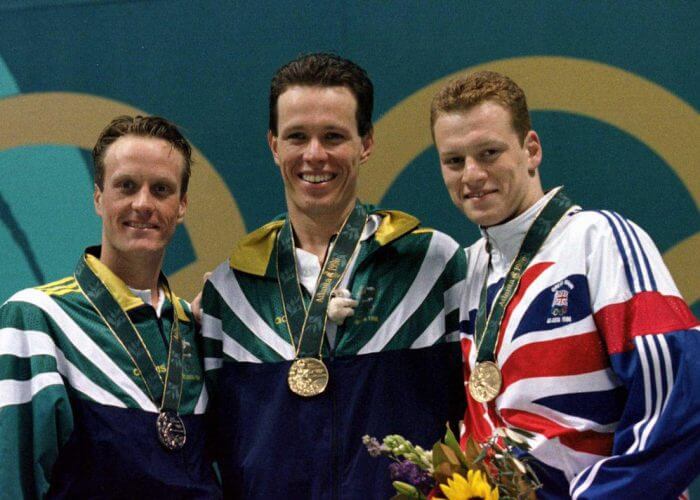
Stockport Metro’s Graeme Smith, 1500m free bronze behind Aussie Kieren Perkins and Daniel Kowalski at Atlanta 1996 – Photo Courtesy: Swimming Australia
1996 Atlanta – Men 1500m Freestyle – Athletes: 34 Nations: 26
- 14:56.40 Kieren Perkins AUS
- 15:02.43 Daniel Kowalski AUS
- 15:02.48 Graeme Smith GBR
15:08.58 Emiliano Brembilla ITA
15:14.63 Ryk Neethling RSA
15:17.28 Masato Hirano JPN
15:18.86 Jörg Hoffmann GER
15:21.68 Alexei Akatiev RUS
Date of final: July 26, 1996
On July 23, 1996, the Olympic 400m freestyle final got underway without the world record holder, Kieren Perkins (AUS). Olympic champion and silver medallist in the 1,500m and 400m respectively in 1992, Perkins had set breathtaking world records in the summer of 1994, leaving the 1,500m mark at 14:41.66 at the Commonwealth Games in Victoria, Canada, before taking an axe to the 400m mark in 3:43.80 to lift the world title in Rome the following month and claiming a golden double with victory in the 1,500m. The 400m record would survive until the advent and rise of Ian Thorpe (AUS) in 1999.
But at Australian trials in 1996, Perkins was below par and missed the grade in the 400m. It looked as though his 1,500m crown might also pass to others. The picture did not change in the heats at the Olympics: Perkins made the final in last place by just 0.23sec ahead of Steffen Zesner (GER). The mantle of favourite Australian appeared to have passed to Daniel Kowalski at a moment in the Games when the Dolphins thirsted for gold: Kowalski had already won bronze medals in the 200m and 400m.
In the final, Perkins attacked from the start, turning first at the 100m mark in 55.30, to 55.73 for Kowalski, the field already more than a second back, with Graeme Smith (GBR) fifth in 57.23. By 500m, Perkins had opened up a slightly bigger lead, at 4:53.45 to Kowalski’s 4:56.34, with Smith, having worked his way past Masato Hirano (JPN), on 4:58.85, with 1991 world champion Jorg Hoffmann (GER), 0,35sec behind the Scotsman. By 800m, Perkins, on 7:53.85, had built a lead of almost 5sec, the gap between Kowalski and Smith narrowed by 0.5sec, with Emiliano Brembilla (ITA) racing past Hoffmann to within 5sec of his British target.
Just 200m later, with Kieren Perkins on 9:54.44, Smith, having sensed the Italian danger, pressed on to get within 0.32sec of Kowalski, at 10:02.24. From then until the last turn, Smith’s splits were a fraction faster than Kowalski’s and as the champion celebrated after retaining his crown in 14:56.40, the sprint for the wall went to Kowalski by just 0.05sec from Smith.
Perkins’s victory gave Australia its first gold of the Games in the pool and made him the first man to retain the 1,500m since Michael Burton (USA) in 1972 (Susan O’Neill stormed to a 2:07.26 win in the 200m butterfly to give the Dolphins a second gold). Kowalski’s silver made him the only man in history ever to win medals in the 200m, 400m and 1,500m in Olympic waters.
Smith, meantime, missed selection for the 1,500m at the 2000 Games when Kieren Perkins lost his crown to Grant Hackett (AUS) but a year further on the Briton claimed silver and bronze medals in the 1,500m and 800m freestyle respectively at the World Championships in Fukuoka behind two young Australians at the peak of their powers, Hackett (1,500m champion) and Ian Thorpe (800m champion).
Grant Hackett – The First Win:
2000 Sydney – Men 1500m Freestyle – Athletes: 41 Nations: 32
- 14:48.33 Grant Hackett AUS
- 14:53.59 Kieren Perkins AUS
- 14:56.81 Chris Thompson USA
14:56.88 Alexei Filipets RUS
15:00.48 Ryk Neethling RSA
15:08.61 Erik Vendt USA
15:08.80 Igor Chervynskiy UKR
15:19.87 Heiko Hell GER
Date of final: September 23, 2000
There was no avoiding the most anticipated clash between two Australian ironmen of the pool in Olympic history since Rose and Konrads had gone head-to-head in 1960.
News readers, sports commentators; newspapers, bartenders, tellers at the supermarket checkout; mothers of curious offspring who demanded answers to the burning questions raised by a 30-lap duel; sun-worshippers on the beaches of an Australia that enjoyed fine sunny weather for the duration of the Games in Sydney – everyone was in on the action. The names on everyone’s lips in swimming paradise were Kieren Perkins and Grant Hackett – respectively king and world-champion pretender in the 1,500m freestyle.
Just how big the moment was ion Australia was lost on many, including the then Sports Editor of The Times in London, David Chappell. In Sydney to run the first Olympics at which the con tent was placed online ahead of the newspaper, he’d told the paper’s swimming correspondent, Craig Lord, that he intended to spend a rare evening “off” downtown, for a meal with his wife. “Get their early,” said Lord or you’ll get no table and not even a seat”.
“Ha!” came the reply. The next day he related the moment he realised his correspondent had not been joking: the scene in the harbour was “sold out” … as he put it “… not a seat to be had, with people hanging out of every window and doorway straining their necks to get a view of a screen.” There was no other show in town. It was what you might see for a big football match … but for swimming.
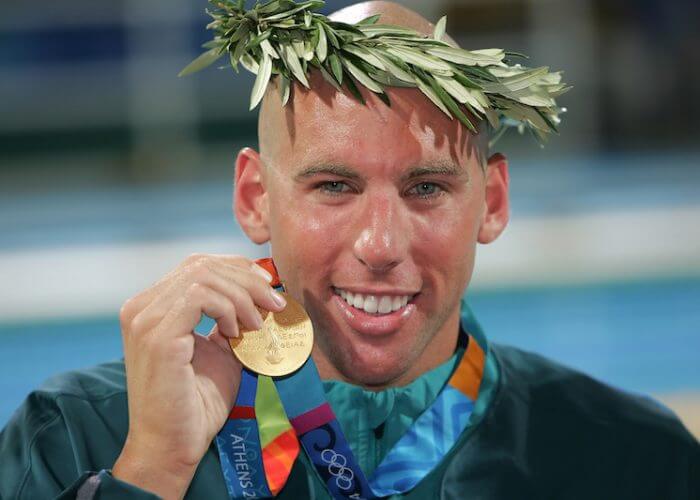
Grant Hackett in the midst of a golden career, an Olympic crown retained at Athens 2004 – Photo Courtesy: Patrick B. Kraemer
Come the big moment – Perkins having cruised to the helm of the final in a gauntlet-throwing 14:58.34 at the end of a week that had seen a sickly Hackett perform well below best and out of contention in two events in which he might have challenged for medals (200m and 400m freestyle) – it was standing-room only in a city that was brought to a standstill for a race that broadcasters elsewhere in the world often seek to cut to the closing 200m to avoid boring their audience.
Not in Australia, where the 1,500m is part of sporting lore, revered by those who understand the tradition of the longest race in the Olympic pool. Perkins’s heats time was his first sub-15-min effort since he had retained the crown in 1996. Hackett went through in 15:07.50, with South Africa’s Ryk Neethling and Americans Erik Vendt and Chris Thompson and Russian Alexei Filipets in the mix.
In the final, Hackett left nothing to chance, the lessons of how Perkins had won his races – from the front – having been learned and honed. He took control of the race from the very start and never looked back, the splits of the two men as follows: 55.36 to 56.12 (100m); 1:53.66, 1:55.24 (200m); 3:52.39, 3:54.37 (400m); 7:51.74, 7:53.57 (800m), with Neething, Vendt and Thompson following on just under the 8-minute mark.
From the 1,000m mark, the front-end battle stayed the same and the crown passed from Hackett to Perkins in 14:48.33 to 14:53.59.
The battle for bronze was a thriller: from 1,000m Filipets picked off his rivals one by one, with Vendt and Neethling feeling the heat of a fast first 500m, drew level and got a touch ahead of Thompson, only to find that the American was not done yet. Down the last 50m, Thomspon split 27.52, to 28.12 for Filipets and the prize was his by 0.07sec in 14:56.81.
Grant Hackett was overjoyed:
“I turned at the 100-metre mark easy and said, ‘I can do this’; and each 100 metres after that I said, ‘You can do it, you can do it.’ I never really knew I had it till I touched the wall. This is everything. This is the one you want to win. This is the Olympics, in your own country, here in Sydney. I mean, it’s everything you work for. It comes to this day, and I’ve done it and I’m very happy.”
Kieren Perkins was a gracious world record holder and former champion, saying:
“I gave it everything I had tonight. All credit to Grant; he deserves it. He’s been up there for the last four years.”
He thanked his coach, “Mr [John] Carew” (as he always called him), his wife, children and sponsors. “They supported me for a long time and I wouldn’t be here without them,” said Perkins before calling it a day in the pool. Much happened that day in Sydney but for Australians, at least, nothing else mattered very much, it seemed, as the replays played on long into the night and bar-room chatter fed many a book and column devoted to sports lore and The Australian 1500m freestyle tradition.
Grant Hackett Keeps The Crown
2004 Athens – Men 1500m Freestyle – Athletes: 34 Nations: 28
- 14:43.40wr Grant Hackett AUS
- 14:45.29 Larsen Jensen USA
- 14:45.95er David Davies GBR
14:52.48 Yury Prilukov RUS
15:03.69 Spyridon Gianniotis GRE
15:09.71 Graeme Smith GBR
15:10.21 Dragos Coman ROM
15:13.66 Craig Stevens AUS
Date of final: August 21, 2004
By the dawn of the 1,500m final at the 2004 Games in Athens, there was no doubting the name of the favourite. Defending champion Grant Hackett had won the 2001 (in a staggering 14:34.56 world record) and 2003 world titles and had enjoyed a stellar week in Athens: silver in a thrilling battle behind teammate Ian Thorpe in a 400m final that ended 3:43.10 to 3:43.36; silver as a member of the 4x200m relay; and fourth in the 200m a touch behind Thorpe, Pieter van den Hoogenband (NED) and Michael Phelps (USA) in what was, somewhat prematurely and rather unfairly as far as other events were concerned, dubbed the “race of the century”.
Hackett was a defending 1,500m champion in form and on a roll.
He lived up to his billing but the fight to retain his crown was epic in nature, with Larsen Jensen and David Davies becoming the first beyond Perkins and Hackett to race below 14mins 50sec.
The race marked a seismic shift in the event and would be followed in the few years ahead by a flood of sub-15-minute efforts that threatened the first entire sub-15-minute final at the Olympic Games in Beijing 2008. Hackett won by racing an average just 0.09sec a lap faster than his rivals, all of which was gained in the opening and closing 100m of the tussle.
In the middle of the race, Davies and Jensen swam faster than Hackett as they tried to play catch-up. The podium was in place by 500m, Hackett on 4:53.00, to 4:56.12 and 4:56.68 for Davies and Jensen. By 800m, Hackett held the same 3sec lead but over the following 200m, Davies and Jensen halved his lead in their drive to break each other, that fight too much for Yuri Prilukov to handle, the Russian’s chance of a medal fading with every passing 100m from the 800m mark.
From the 1,100m mark the prospect of an upset had the crowd and media on their feet as Jensen got the edge of Davies and closed the gap to 1.13 behind the leader. Next 100m: 0.9sec; next 100m, 0.16sec, with Davies digging deep to hang on, 1.41sec adrift. The last 100m told a story of supreme fitness, drive, determination and skill, the respective splits: Hackett – 56.08; Jensen – 57.81; Davies – 57.06. Hackett and Davies raced inside 28sec down the last length.
The crown was retained in 14:43.40, an Olympic record 0.08sec inside the 1992 monument of Kieren Perkins, while Jensen fended off the last-gasp sprint of Davies for silver in 14:45.29, a US record, ahead of a 14:45.95 that brought the European record for the bronze medal winner from Wales.
After the race, a reporter asked Hackett about the many e-mails he received from women who claimed to have become pregnant during the 1,500m final. He replied:
“Yes, that’s interesting that they should have become pregnant while I was swimming 1,500m. I guess they’re lucky I’m a distance specialist not a sprinter – otherwise it would all have been over in less than a minute.”




Great article.
Sun Yang????
Carlos – Sun Yang has two doping infractions to his name and is currently suspended for eight years (his appeal to the Swiss federal tribunal not yet resolved but the suspension active right now): we stated at the start of the exercise that no swimmers suspended for a banned substance would be considered for our League of Legends, for obvious reasons.